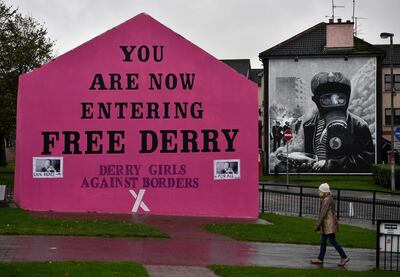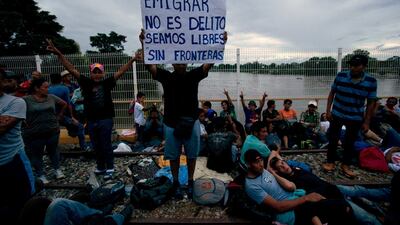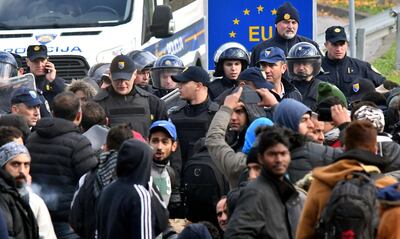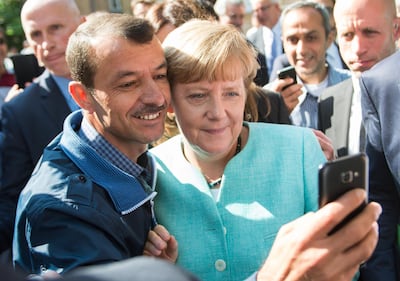It is both unfashionable and perhaps cheerless to argue that borders are necessary. Unfashionable, because we are told that this is the age of globalisation in which "the world is flat", according to the book title of American author Thomas Friedman. And cheerless, because to argue that borders are necessary is to accept that humanity has yet to advance to a place in which conflict is redundant. However, we are not in that place yet and so in many places now, borders are indeed required. What is not in dispute is that they are contentious.

Borders are deeply political. At a state level, they signify sovereignty, marking the territory that is "ours" as opposed to "yours". Recognition of them confers approval, which bring us to the M5 highway in Syria heading south towards the Nassib border crossing with Jordan.
It is three-and-a-half years since Bashar Al Assad lost control of the crossing to rebel forces. In July this year, the Syrian regime retook the post, along with a swathe of territory. That was a military victory; what has followed is a political one. Damascus and Amman had to negotiate the reopening. In doing so, Jordan by default had to recognise the very government the world once thought would be overthrown. At a practical level, the reopening will help facilitate Syria's reintegration into the regional economy, despite its ally, the US, still trying to isolate the country.
Media coverage of the reopening simply showed a few cars and trucks passing through the crossing – and yet they signified so much more. The Syrian-Jordan border is one of those dividing lines based more on history and politics and less on geography. Many others are drawn by the physical landscape. Mountains, rivers and shorelines have shaped cultures, many of which, over centuries, have become nations and eventually nation states, countries with a distinct cultural or ethnic identity. There are, for example, clear divides between China and India, Norway and Sweden, and Italy and its northern neighbours, in the shape of the mountains between them. Granted, cultures can blur slightly at the edges of the divide but mountains are the defining features.

The Caucasus are possibly the best example. More than 40 different languages are spoken in the region, many of which bear little – and sometimes no relation – to outside influences. This is almost certainly because the mountainous terrain prevented trade between people or protected them from each other. These divisions remain relevant, as we saw in the South Ossetia conflict in 2008, when a separatist movement broke out in Georgian provinces. Russia became involved for geopolitical reasons but the Georgians and Ossetians were busy arguing about which of the ethnicities had first arrived in the territory many centuries earlier. Kosovo's Serbs and Albanians have a similar dispute.

These disputes, based on culture and nationalism, are not going away. Indeed, the nation state might be making a comeback after being written off by some intellectuals in the heady days of the aftermath of the fall of the Berlin Wall in 1989. The EU's experiment in diluting sovereignty was doing pretty well until this decade, when it was tested as never before, and not simply by the Brexit referendum of 2016. The 2008 crash meant that austerity was kicking in. Simultaneously, the first ripples of a fast-moving tide of automation were being felt and then in 2015 the migrant situation peaked, followed by several high-profile terror attacks.
The effects were immediate. Six members of the Schengen Agreement, allowing freedom of movement between signatories, suspended participation. As the migrant flow continued, Austria threatened to place troops at the Brenner Pass and, across the EU, extreme right-wing parties made significant gains in national elections. All the while, border fences were being built in Greece, Hungary, Serbia, Macedonia, Croatia, Bulgaria, Austria and elsewhere.
A deeper effect is the challenge this brings to the concept of multicultural societies. How deep this goes was laid bare in 2015, when even a previous supporter of what the Germans term "multi-kulti", Chancellor Angela Merkel, declared: "Multiculturalism leads to parallel societies and therefore remains a sham".
This is different from multi-ethnic societies and one of the lessons to be learned from the past decade is that greater efforts are required to assimilate people from other regions into the cultures of where they move to, whether it Somalians living in Eastleigh in Nairobi, known as “Little Mogadishu”, Syrians in Germany or Bangladeshis in India. Discrimination is inevitable but tensions would be reduced and the life opportunities of immigrants would be enhanced.
Another effect of all this is that unilateralism is also making a comeback. The prime example is the US, although this is sometimes wrongly thought of as a retreat from the world stage. US President Donald Trump increasingly acts on that stage without regard to others, including allies. He bombed Syria, put troops back in Afghanistan, tore up the Iran deal and is negotiating with North Korean leader Kim Jong-un. His actions are those of a unilateralist, not an isolationist and they spring from his “America First” ideology, which is rooted in nationalism. He is the most visible of the new wave of so-called strongmen riding this wave, along with leaders such as Xi Jinping in China, Narendra Modi in India, Viktor Orban in Hungary and Rodrigo Duterte in the Philippines.

It should not, therefore – but often does – come as a surprise to learn that more than 65 countries now wall or fence themselves off from their neighbours; one third of all nation states. Of all the border walls and fences built since World War II, more than half went up this century, the cement laid without us really noticing. Mr Trump’s Mexican wall gets the headlines but this is a global phenomenon. Turkey has built a 700 mile-long concrete wall along its border with Syria, Kenya has just finished building fortifications on its border with Somalia and Iran has fenced off Pakistan.
India’s decision to fence 2,500 miles of border with Bangladesh is instructive in showing us how the era of wall-building is not just about people in the developing world moving to industrialised nations. The barrier is New Delhi’s response to 15 million Bangladeshis moving into Indian border states this century. That has changed the demographics of states such as Assam, which has led to ethnic clashes, including a significant loss of life.
The headlines afforded Mr Trump’s wall distract from the bigger picture. It is easier to have a big, bad wolf to huff and puff against than it is to see him as part of a global phenomenon. Concentrating on Mr Trump leaves the Mexican government to quietly get on with deporting far more Central Americans from its country each year than the US does. Granted, the US assists Mexico with this but last year Mexico deported 165,000 Central Americans while the US expelled 75,000.
Both countries are this month challenged by the migrant march from Central America, now heading for the US. The American president insists his Mexican counterpart has the responsibility of preventing people from reaching the border and threatens to send troops to the frontier if this is not achieved.
Other borders are also in the news. The Brexit negotiations have been bedevilled by the status of the Northern Ireland border with the Republic of Ireland. How can the UK leave the EU but have a soft no-checks border between the north and south, which would theoretically allow the free flow of goods and people from the UK into the EU and vice versa? Conversely, how can the UK agree to harden the border, knowing that could spark a return to the bombs and bullets of The Troubles, which cost so many lives?

From the above, you might conclude that borders are the cause of the problems. But in the modern world, if were without them – then what? If one group of people in a region did not want a huge group of people from a nearby region to suddenly arrive, stay and begin taking many of the resources, what would be the ground rules for any dispute? If it was that the location was where one group arrived first and therefore had more rights, at that point you would have drawn a border. And what if you were in one region but, along with your family, you fled persecution? Without a border, where would be the place to which you could go but your persecutor could not?
Tim Marshall is the author of the bestselling Prisoners of Geography and the recently released Divided: Why we are Living in an Age of Walls



